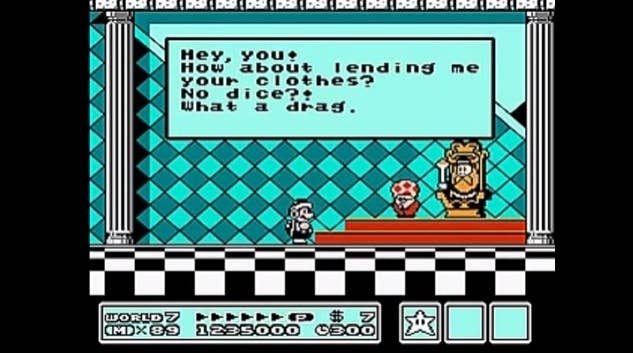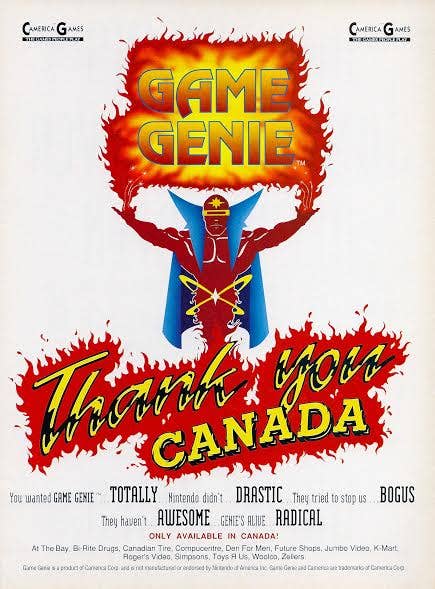Only '90s Kids Want to Remember: Game Genie's "Thank You Canada" Ad
Totally an innocent "Thank You" note and not engineered to tempt US buyers into crossing the border. Scout's honor!
This article first appeared on USgamer, a partner publication of VG247. Some content, such as this article, has been migrated to VG247 for posterity after USgamer's closure - but it has not been edited or further vetted by the VG247 team.
Nintendo is a company that holds its cards very tightly to its bosom. This secrecy was necessary when the Famicom and NES were rolled out: Third party developers had already made it painfully clear they had no qualms about pumping a lot of sewage onto popular game systems if it meant they could make a quick buck.
Nintendo's lock-out chips and licensing fees gave it some measure of control (and the extra cash said fees brought in didn't hurt the company's feelings, either). A lot of third-party garbage still befouled the Famicom and NES, but even the D-grade wrestling game M.U.S.C.L.E. wasn't at an Atari CES Chase the Chuck Wagon-level of shamelessness.
Given Nintendo's penchant for keeping its hardware locked down, it's no wonder the company went orangutan when a British company called Codemasters developed a handy little piece of hardware that let frustrated kids "live forever" and perform other game-breaking tricks on the NES.
Worse (for Nintendo), the Game Genie piqued players' interest right away. Though this current generation of adult gamers loves to puff out its chest and declare how we never needed automatic steering and white tanooki suits, the promise of blazing through Ninja Gaiden without dying over and over at the wings of nightmare-birds proved to be a very juicy piece of forbidden fruit.
Nintendo wasted no time chasing down the Game Genie's North American distributors: Galoob in the US and Camerica in Canada. Camerica distributed unlicensed NES games as well as the Game Genie, so it was well-versed in p**sing Nintendo off.
Nintendo's lawsuits against Galoob and Camerica proved time-consuming, costly, and ultimately, unsuccessful. That said, Nintendo did manage to tie up the Game Genie's US distribution for a time, during which the "game enhancer" was still available in Canada.

Camerica subsequently published a 100% totally innocent "Thank You" ad in game magazines at the time, letting people know that the Game Genie was "only available in Canada." Of course, the ad was in no way meant to coax Americans into doing a little cross-border shopping ("Anything to declare?" "Yeah, the Thunderbird from Zelda II is gonna be so frickin' dead, you have no idea").

I'll transcribe the small text at the bottom of the ad. Make sure to vaccinate yourself against '90s poisoning first, though. This is a doozy.
"You wanted Game Genie ... TOTALLY ... Nintendo didn't ... DRASTIC ... They tried to stop us ... BOGUS ... They haven't ... AWESOME ... Genie's alive ... RADICAL."
I'm no marketing expert, but there should be an exclamation mark at the end of that outpouring. Otherwise it all comes across as the monotone chanting of a madman leading a cult service.
The ad also features a long list of Canadian stores you can buy the Game Genie at. Again, it's totally not for the benefit of any Americans who decide to indulge in some cross-border shopping, no sir. Wow, some of these store names make me feel nostalgic. Simpsons, Woolco, Jumbo frickin' Video ... Ahh. Jumbo Video gave you free popcorn while you browsed over its video and game selection. It was terrible popcorn, mind you, but it was free popcorn.
If you're an American who stepped across the border to buy your illicit game enhancement drugs, feel free to share your story. We won't tell the cops, we promise.

